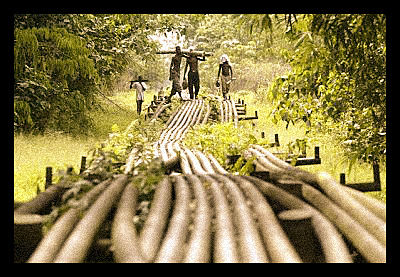Nigeria Poverty Rising Despite Economic Growth

In the last several years, Nigeria has seen an increase in its economic state. However, Nigeria is a country that follows the profile of African countries: a land rich in natural resources, yet much of its population remains in poverty. Despite the economic growth due to its oil revenue, Nigeria has been hindered by other problems for many years. An unstable government, a lack of cultivated land and the lack of progress made in rural areas all attribute to Nigeria’s high poverty rates.
Nigeria’s government has come under heavy criticism. The country relies primarily on its oil revenue to strengthen the economy, thereby eliminating the need for taxpayers to maintain the government officials’ salaries. The salaries of these high ranking officials often exceed $100,000, while the average family survives on $1.25 per meal. The large discrepancy between the working people and the government officials is no secret; the government corruption occurring in Nigeria is one of the worst on the planet.
The agricultural sector of the country employs roughly two-thirds of the working population. Nigeria is a world leader in production of cassava, yam and cowpea. Nigeria is also a major player in the fish industry. But the country still struggles with starvation levels, and Nigeria relies on large imports of grains, livestock products and other food products.
However, Nigeria has a huge agricultural base that offers great potential for growth and improvement. The agricultural sector has shown progressive improvements over the years, growing by 7 percent from 2003 to 2007. However, the large percentage of potentially cultivated land remains untapped.
Of an estimated 71 million hectares of potentially cultivated land, only about half is under production. There is a lack of productive irrigation methods prevailing over the land. Of the potential workable land, only about 7 percent is being properly irrigated. With an enhanced emphasis on irrigation and other land cultivation techniques, the substantial natural resources of Nigeria could be put to better use.
Urban areas in Nigeria have shown an increase in well-being over the past years. However, much of the rural areas in the country are mired in extreme poverty, living on scraps and from meal to meal. The people who work the fields in the rural areas are practically living off the food they produce, then they sell anything they can to mass production.
Nigeria is a nation that has extraordinary natural resources. However, the nation is held back by its various national issues. With a significant amount of corruption running throughout the government, the head of the country is in dismay. Without a solid government, the backbone of the country is crippled. Having great natural resources is only a positive factor when they are employed to their full potential. By not cultivating the majority of the usable land, Nigeria is limiting itself. Lastly, the lack of development in rural areas hurts the economy as a whole, not only the people residing in those rural areas. Better conditions could help the food production, which in turn would help cultivate the land more effectively. Nigeria has enormous potential, yet the proper leadership and productivity is lacking.
– Zachary Wright
Sources: Punchng, Rural Poverty Portal, BBC News, Daily Mail UK
Pictures: Daily Mail UK
